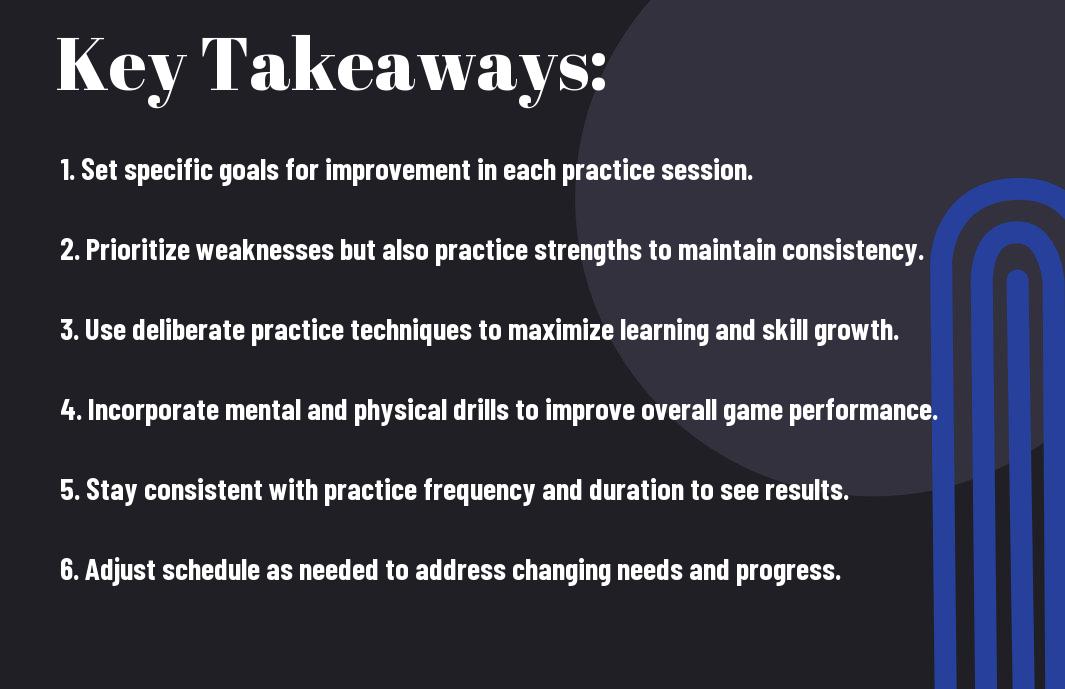Are you tired of consistently scoring higher than you’d like on the golf course? If so, it may be time for a change in your practice routine. Creating a practice schedule that is strategic and effective can lead to lower scores and a more enjoyable game overall. In this blog post, we will explore the best practices for creating a practice schedule that leads to lower scores on the golf course. From incorporating various types of practice sessions to setting specific goals, we will cover all the essential steps to take your game to the next level. With the right approach to practice, you can expect to see significant improvements in your golf game and ultimately achieve the scores you’ve been aiming for.
Key Takeaways:
- Consistency is key: Creating a consistent practice schedule will lead to lower scores by allowing for optimal muscle memory and skill development.
- Focus on weaknesses: Identify your weaknesses and tailor your practice schedule to address them specifically, leading to overall improvement in your game.
- Integrate mental practice: Incorporating mental practice and visualization into your schedule can help increase confidence and reduce stress on the course, ultimately leading to lower scores.

Foundations of an Effective Practice Schedule
Obviously, creating an effective practice schedule is essential for improving your golf game. It requires careful planning and organization to maximize your practice time and ultimately lower your scores. To help you get started, consider using a Practice Schedule Template & Example to structure your practice sessions.
Goal Setting for Improvement
One of the foundations of an effective practice schedule is setting clear and achievable goals for improvement. Whether it’s mastering your drive or perfecting your putting, having specific objectives will keep your practice sessions focused and productive. Start by identifying your weaknesses and setting measurable targets to address them. Regularly revisit and adjust your goals as you make progress, ensuring that your practice schedule remains aligned with your improvement objectives.
Time Management for Busy Golfers
An efficient practice schedule should also consider time management, especially for busy golfers with multiple commitments. Schedule regular practice sessions into your calendar and treat them as non-negotiable appointments. Prioritize your practice time by eliminating distractions and focusing solely on your golf game. Consider breaking up your practice into shorter, more frequent sessions to maintain consistency and prevent burnout.
Schedule your practice sessions during off-peak hours at the golf course to avoid overcrowding and optimize your time on the driving range or putting green. Furthermore, consider incorporating practice drills that simulate real on-course scenarios to make the most of your limited practice time.
Components of a Balanced Practice Routine
Not all practice is created equal. To create a practice schedule that leads to lower scores on the golf course, it is important to include a variety of components in your practice routine. By focusing on technical skill development, mental game strategies, and physical conditioning, you can improve all areas of your game and ultimately lower your scores.
Technical Skill Development
An effective practice routine should include dedicated time for technical skill development. This may involve working on your grip, stance, posture, and swing mechanics. Consider incorporating drills and exercises that target specific aspects of your game that need improvement. For example, if you struggle with your short game, spend extra time practicing chipping, pitching, and putting to refine your technique and build consistency.
Mental Game Strategies
An often overlooked aspect of practice is mental game strategies. Mental toughness and focus are critical components of a successful golf game. During your practice sessions, set aside time to work on visualization, course management, and coping with pressure situations. By incorporating mental game strategies into your practice routine, you can develop the confidence and resilience needed to perform at your best on the course.
A well-rounded practice routine will include strategies to improve not only your physical skills, but also your mental approach to the game. Building a strong mindset and mental resilience can make a significant impact on your overall performance and ultimately lead to lower scores on the golf course.
Physical Conditioning
On top of technical skill and mental strategies, physical conditioning plays a crucial role in a balanced practice routine. Engage in exercises and activities that enhance your strength, flexibility, and endurance. By incorporating physical conditioning into your practice routine, you can improve your overall fitness and prevent injuries that may hinder your performance on the course.
It is essential to recognize that physical conditioning is not just about building strength; it also involves maintaining flexibility and endurance, which are vital for a successful golf game. Incorporating a variety of physical conditioning activities into your practice routine can lead to improved performance and lower scores on the golf course.
Execution and Adaptation
Your practice schedule is only as good as your ability to execute it and adapt it to your needs. It’s essential to approach your practice with focus and determination, but also to remain flexible enough to make adjustments as needed.
Tracking Your Progress
To make sure your practice schedule is leading to lower scores, it’s important to track your progress regularly. Keep a log of your performance on the range or course, noting any improvements or setbacks. This will help you identify patterns and areas that need more attention. Additionally, tracking your progress can provide a sense of accomplishment and motivation as you see your scores improve over time.
Adjusting Your Schedule for Continuous Improvement
For continuous improvement, it’s crucial to review and adjust your practice schedule regularly. Analyze your tracking data to identify any weaknesses or areas where you’re not seeing the progress you desire. With this information, you can make targeted adjustments to your schedule, such as adding more practice time for specific skills or changing the timing of your sessions. Adapting your schedule to address your weaknesses will help you continue to improve and lower your scores.
With dedication and a willingness to adapt, you can create a practice schedule that will lead to lower scores and improved performance on the course. It’s important to commit to regular tracking and adjustments, and to approach your practice with a mindset of continuous improvement. By tracking your progress and making targeted adjustments, you can ensure that your practice schedule is tailored to your specific needs and goals, ultimately leading to lower scores and greater satisfaction with your game.
Additional Tips for Practice Efficiency
Now that you have a solid practice schedule in place, there are a few additional tips that can help you make the most of your time on the course or at the range. By incorporating these tips into your routine, you can further enhance your practice efficiency and ultimately lower your scores.
Quality over Quantity
Tips: When it comes to practice, it’s important to prioritize quality over quantity. Instead of mindlessly hitting a large bucket of balls, focus on each shot with intent and purpose. Take the time to carefully analyze your swing, alignment, and ball flight, making adjustments as needed. It’s also beneficial to incorporate specific drills and exercises that target your weaknesses or areas for improvement. By practicing with intention and attention to detail, you can make each shot count and see significant improvements in your game.
Incorporating Variety and Fun
An effective practice routine should also incorporate variety and fun to keep things interesting and engaging. By mixing up the types of shots you practice, such as working on different clubs, lies, and distances, you can simulate the unpredictable nature of a real round of golf. Additionally, incorporating fun games and challenges into your practice routine can help maintain motivation and focus. It’s important to keep the atmosphere light-hearted and enjoyable, so that you look forward to practicing and are more likely to stick to your schedule. Any opportunity to inject enjoyment into your practice will ultimately lead to better results on the course.
It is important to keep your practice routine fresh and engaging. By incorporating variety and fun into your practice, you can maintain motivation and focus, ultimately leading to lower scores on the course.
Practice Schedule for Lower Scores FAQ
Q: Why is having a practice schedule important for lowering golf scores?
A: A practice schedule is essential for lowering golf scores because it allows you to focus on specific areas of your game that need improvement. With a structured schedule, you can dedicate time to practicing your weaknesses and strengthening your strengths, leading to overall improvement in your game and ultimately lower scores.
Q: What should a well-rounded practice schedule include?
A: A well-rounded practice schedule should include a mix of different types of practice, including technical work on your swing, short game practice, putting practice, and on-course simulation. It’s important to also allocate time for physical conditioning and mental preparation, as these aspects play a crucial role in improving your game and leading to lower scores.
Q: How can I create an effective practice schedule for lowering my golf scores?
A: To create an effective practice schedule, start by identifying your weaknesses and areas of improvement. Allocate specific time slots for each aspect of your game, such as driving, iron play, chipping, putting, and mental preparation. Schedule regular on-course practice sessions to simulate real-game scenarios. It’s also important to include rest and recovery days in your schedule to prevent burnout and allow your body to recover. Regularly assess your progress and adjust your schedule accordingly to continue improving and ultimately achieve lower scores on the golf course.
Hey, I'm Maxwell Fairway, a name that's been echoing on golf courses for over a decade. Golf has been my driving force, propelling me through the world of fairways and greens since my early days. With each swing, I've crafted my skills, refined my approach, and gained invaluable wisdom about this captivating sport.






